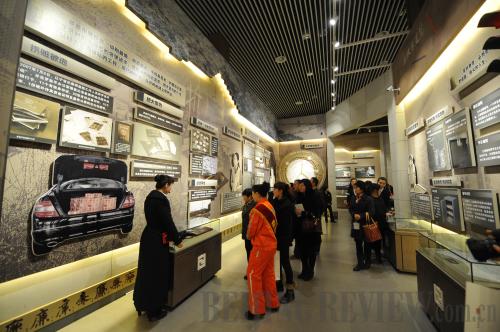|
 |
|
RAISING AWARENESS: Local residents visit an anti-corruption exhibition in Shenyang, Liaoning Province, on March 5 (PAN YULONG) |
On March 13, the Second Session of the 12th National People's Congress (NPC) concluded in Beijing. At a press conference held right after the closing of the annual parliamentary session, Premier Li Keqiang reiterated that China will show "zero-tolerance" to corrupt officials.
"China is a country under rule of law. No matter who he is, and how senior his position is, if he violates Party discipline and the law of the country, he will be punished to the full extent, because everybody is equal before the law," Li said.
Before this year's NPC session started, China Youth Daily conducted a telephone survey among 65 NPC deputies on topics that they were most concerned with.
The survey showed that the three topics that received the most attention were anti-corruption, reform and people's livelihood, which accounted for 67.1, 62.4 and 52.9 percent of respondents, respectively.
Legal enhancements
On March 10, while delivering a work report to lawmakers, Cao Jianming, Procurator General of the Supreme People's Procuratorate, said that 37,551 corruption cases involving 51,306 persons were probed in 2013.
According to Cao, procuratorial departments across the country investigated 2,871 public servants at county levels and above last year, including 253 at city levels and eight at provincial and ministerial levels, in 2,581 cases of graft, bribery, and embezzlement of public funds involving more than 1 million yuan ($161,000).
"In the past two years, anti-corruption efforts have produced very good results. Yet the better the results are, the more the general public worry about whether or not the battle against corruption is sustainable. Hence, many people have called for the establishment of an effective long-term mechanism against corruption," Wu Qing, an NPC deputy from Guangdong Province and partner of the King & Wood Mellesons law firm, told Beijing Review.
Wu said that legislation against corruption must be strengthened so as to combat corruption in an institutionalized and standardized way.
In his interview with Beijing Review, Chen Xu, an NPC deputy and Procurator General of the Shanghai Municipal People's Procuratorate, stressed that a comprehensive anti-corruption law must be made and anti-corruption agencies should be given a greater degree of independence and more power.
Chen said that in China, anti-corruption agencies include procuratorial departments and anti-corruption bureaus, yet there is not a specific law to codify their responsibilities, tasks, as well as work procedures and methods. "These legal rights can only be conferred by law," he added.
Prevention and control
NPC deputy Zhao Kai, an official from the Work Committee of Departments under the Communist Party of China (CPC) Central Committee, called for making an anti-corruption law integrating relevant contents in substantive laws, procedural laws, administrative laws and organizational laws so as to boost anti-corruption work in accordance with concrete legislation.
When investigating corruption cases, procuratorial departments should thoroughly analyze the process that turns people into criminals, uncover blind spots where power has not been supervised, and inform relevant organizations of these blind spots so as to help them prevent corruption, according to Chi Qiang, Procurator General of the Beijing Municipal People's Procuratorate. Chi made the remark during a panel discussion by Beijing's NPC deputies on the work reports of the Supreme People's Court and the Supreme People's Procuratorate on March 11.
Chi's opinion was echoed by Chen from Shanghai, who suggests that a special department to prevent corruption should be set up in anti-corruption agencies.
Chen said that Hong Kong's Independent Commission Against Corruption has a corruption prevention division dedicated to preventing graft in the government, public institutions and enterprises. Staff members at the division can attend meetings and read documents of these organizations to identify loopholes and put forward suggestions for improvement.
Wu from Guangdong commented that both punishment and prevention are essential in the fight against corruption. "Prevention should be a key focus in the legal system when it comes to corruption," she noted.
| 